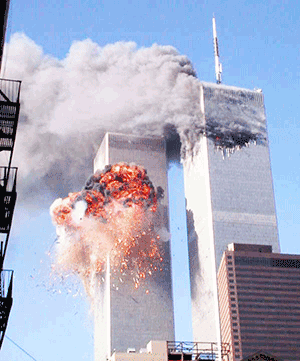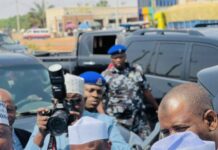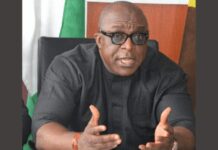Last Thursday was the 13th anniversary of the September 11,2001 terror attack on America. Assistant Politics Editor, DANIEL KANU, recalls the incident and security threat around the globe
World Trade Center in flames in 2001
The world, on Thursday, remembered the suicide attacks on the United States (U.S.) now popularised as 9/11. It was the 13th anniversary of the worst terrorist attack suffered by America. Since then, terrorism seems to have assumed wider dimension globally.
The tragic incident was a series of four coordinated terrorist attacks launched by the Islamic terrorist group, Al-Qaeda, on New York City and the Washington D.C. Metropolitan Area on Tuesday, September 11, 2001. The attacks killed almost 3,000 people and caused at least $10 billion in property and infrastructure damage.
With the destruction of the 110-storey World Trade Center (WTC) in the heart of Manhattan, that date has remained a day of horror that took terrorism to unimaginable dimension.
It was a day four passenger airliners were hijacked by 19 Al-Qaeda terrorists, flown into buildings in suicide attacks. Two of those planes, American Airlines Flight 11 and United Airlines Flight 175, were crashed into the North and South towers, respectively, of the WTC twin towers in New York City.
A third plane, American Airlines Flight 77, was crashed into the Pentagon (the headquarters of the United States Department of Defence), leading to a partial collapse in its western side, while the fourth plane, United Airlines Flight 93, was targeted at Washington, D.C., but crashed into a field near Shanksville, Pennsylvania, after its passengers tried to overcome the hijackers.
In total, almost 3,000 people died in the attacks, including the 227 civilians and 19 hijackers aboard the four planes. It also was the deadliest incident for fire-fighters and for law enforcement officers in the history of the U.S., with 343 and 72 killed respectively.
The mastermind
Suspicion quickly fell on Al-Qaeda, a terrorist group as responsible for the atrocious act. Although the group’s leader, Osama bin Laden, initially denied any involvement, further intelligence investigations showed that he was the mastermind.
Shortly before the U.S. presidential election in 2004, in a taped statement, bin Laden publicly acknowledged Al-Qaeda’s involvement in the attacks on the U.S. and admitted his direct link to the attacks. He said that the attacks were carried out because of “America’s support for the attacks against Muslims in Somalia, support of Russian atrocities against Muslims in Chechnya, support of authoritarian regimes in the Middle East such as Egypt, Saudi Arabia and Jordan, support of Indian oppression against Muslims in Kashmir, the presence of U.S. troops in Saudi Arabia, U.S. support of Israel and the sanctions against Iraq”.
Bin Laden said he had personally directed his followers to attack the WTC. Another video obtained by Al Jazeera in September 2006 showed bin Laden with Ramzi bin al-Shibh, as well as two hijackers, Hamza al-Ghamdi and Wail al-Shehri, as they made preparations for the attacks.
Although, U.S. never formally indicted bin Laden for the 9/11 attacks, he was on the Federal Bureau of Investigation (FBI)’s Most Wanted List for the bombings of the U.S. Embassies in Dar es Salaam, Tanzania, and Nairobi, Kenya. After a nearly 10-year manhunt, bin Laden was killed by American Special Forces in a compound in Abbottabad, Pakistan, on May 2, 2011.
Since the disaster during the George Bush administration, America has vowed to root out terrorism and, till date, the Barack Obama leadership has sworn that it is fight to finish. But the obvious reality is that the business of terrorism has continued to strive, as no part of the globe is safe.
Just as the Boko Haram has continued to take territories in Nigeria, the Islamic State of Iraq and Syria (ISIS) is ravaging Syria and Iraq, maiming, destroying and killing innocent citizens. As it stands now, it does not appear as if any part of the globe is safe from terrorist attack.
“In the fight against terrorism, America must ensure the battle is won because we have the will and the capacity. We will hunt down terrorism, no matter what it will cost us. We know that it has become a global threat, so other well-meaning nations of the world must not sit back. We must win this war against terrorism. America will lead broad coalition against terrorism,” Obama has vowed.
What the world now needs is to be united against terrorism and nothing less, says Martin Onovo, former presidential candidate of the Action Alliance (AA).
Terror groups on rampage
The 9/11 attack has remained a watershed in the history of terrorism globally. Since the Al-Qaeda attack on the U.S., other terror groups seem to have been emboldened, as they have become serious security menace, threatening world peace. A lot of these terror groups, including unaffiliated individuals in the terror business, have continued to terrorise the world with their extreme ideologies.
Some of the groups include: Al-Shabaab, Hamas, Hezbollah, Abu Sayyat, Ansar al-Sharia, Boko Haram, Haqqani network, Harakat-UI-Mujahideen, Islamic State in Iraq and Syria (ISIS), Muslim Brotherhood, Tevhid-Selam, and Islamic Raiders Front.
From Boko Haram in Nigeria to the ISIS ravaging Iraq and Syria – beheading innocent journalists, and Hezbollah terrorising Lebanon, the global threats have continued their killings with impunity.
As Boko Haram dares Nigeria…
Given the emerging scenario, it had become apparent that the course and dimension of the Boko Haram threat had clearly gone beyond the initial assumption of mere restiveness or insurgency.
Boko Haram has made vital gains in the last three weeks, sweeping through communities in Borno, Yobe and Adamawa states, as soldiers struggle to keep them at bay.
Despite that Nigeria is a sovereign state with armed forces that can defend its territorial integrity, Boko Haram still waxes strong, making most right-thinking citizens to wonder.
Many political commentators seem to agree that the audacious nature of the activities of Boko Haram and the precision of its targets had shown the group as having more deadly agenda than might have been imagined by the Nigerian government.
Despite the assurances of President Goodluck Jonathan that Boko Haram would soon be a thing of the past, the sect has continued to launch more deadly attacks, over-running the Nigerian military and taking territories with ease.
If all it will take to put an end to insurgency in Nigeria is occasionally putting up appearances at international conferences on terrorism, Jonathan, in the past two years, would have put a permanent end to the regime of death and suffering being regularly inflicted on Nigerians by Boko Haram. But the result of Mr. President’s presence at such talk shops, to most observers, does not seem to be encouraging.
Just recently, Jonathan travelled to Ndjamena for talks with his Chadian counterpart, Idriss Deby. The trip was in continuation of the federal government’s efforts to forge a stronger alliance with neighbouring countries in the battle against the Boko Haram insurgents and violent extremism.
According to a statement by the Special Adviser to the President on Media and Publicity, Reuben Abati, the talks were expected to lead to the strengthening of the Paris Accord on joint border patrols, intelligence sharing and the prevention of the illicit movement of terrorists, criminals, arms and ammunition across shared borders.
The talks in Ndjamena with President Deby, who is also the current Chairman of the African Union (AU)’s Peace and Security Council, was a follow-up to their discussions in Nairobi earlier on the sidelines of the AU Peace and Security Council Summit.
It is not out of place to say that the Boko Haram group has declared war on Nigerians. Expectedly too, the Nigerian security forces have declared war on the terrorist group, as warplanes carry out air strikes against militant bases in the North East.
Going by reports, strikes have been carried out on all the Boko Haram bases, which seem to be reflecting Jonathan’s order for a “fully fledged war” against the group that has waged a bloody insurgency of Africa’s most populous country since 2009.
The battle over Bama, as well as Boko Haram’s storming of towns and villages to the north, east and south of Maiduguri in recent weeks, has continued to raise fears of great danger ahead, prompting hundreds of civilians to flee.
Before the Bama assault, it was gathered that Boko Haram over-ran a mobile police training facility in Gwoza, abducting and killing some personnel while some are still missing. Still, aside the mugging on Bama, there had been reports of Boko Haram incursion to Gulak in Adamawa State and Buni Yadi in Yobe State.
The situation, to many, has been one of conspiracy, as no one can claim who is telling the truth.
For instance, while the military high command and the Borno State government said that Nigerian troops have captured Bama, the second largest to Maiduguri, the state capital, others disagreed.
Senator Ahmed Zanna, representing Borno Central, challenged the Borno and the military authorities to take journalists to Bama to verify his claims that Bama is within the insurgent’s control.
Said Zanna: “As I am speaking to you, Bama has been captured and the insurgents are on prowl for any male, killing at will. Everyone is a target as long as you are male. For now, women and children are being spared.”
Sadly enough, even the country home of the Chief of Defence Staff (CDS), Alex Badeh, has been overrun by the insurgents, and the people are helpless.
The same scorched earth strategy and eventual annexation was said to have been the case in all the towns overrun by the group, as it fearlessly hoisted its flags in the city centres.
Last year, the United Nations Security Council sanctioned Boko Haram leader, Abubakar Shekau, a splinter terrorist organisation, Ansaru.
With the development, the two groups were banned from international travel, while their assets were frozen under the UN Al-Qaeda sanctions list.
The Security Council of Al-Qaeda Sanctions Committee blacklisted Boko Haram at the request of Nigeria, following abduction of about 250 girls from the Government Secondary School, Chibok, Borno State, on April 14. Today makes it 153rd day the girls have been in Boko Haram’s captivity.
The Islamist militant group was described in the UN listing as an affiliate of Al-Qaeda and the Organisation of Al-Qaeda in the Islamic Maghreb. It is subjected to a travel ban, asset freeze and arms embargo.
What is worrisome to most political watchers is that despite all the sanctions, the activity of the group has continued unabated.
NLC’s charge
The Nigeria Labour Congress (NLC) has expressed fear that the Nigerian military’s image was at stake given the bashing the institution is receiving from the insurgents.
NLC warned that the rapid advance of extremist Boko Haram in Borno, Yobe and Adamawa threatens the reputation of the Nigerian military, and urged the government to do all it can to reverse the tide.
The body said the federal government must urgently provide funding, adequate equipment to the armed forces and proper policing of communities across the country as well as other support needed by the armed forces to address an expanding insurgency that has killed more than 13,000 and has displaced hundreds of thousands.
In a statement issued recently by its president, Abdulwahed Omar, the NLC said it was worried about the recent deadly incursion into some towns and villages in the North East region of the country.
It noted that the violent attacks, reported seizures of communities and declaration of an Islamic republic remain unacceptable and must never be allowed.
The congress also expressed concern at the speed with which the insurgents were overrunning communities, even in areas reportedly with heavy security presence.
Failure to ensure adequate funding of security agencies, the group said, would be a monumental discredit to government under whose direction and authority the overall safety of all citizens was constitutionally placed.
It warned that the consequence of allowing any part of the country to be forcefully seized by any group would be overwhelmingly harmful to the collective unity and socio-economic advancement of the country.
NLC noted that the country’s military personnel, who had been widely acclaimed to have performed well during peace-keeping operations in different parts of the world, are now overrun by insurgents back home.
Army hardtalk
The Defence Headquarters (DHQ) said the armed forces will do everything to defend the nation’s sovereignty and ensure the battle is won.
Director of Defence Information, Major General Chris Olukolade, said: “DHQ wishes to reiterate the pledge and commitment it made while briefing the Joint Committee on Defence of the National Assembly to the effect that everything will be done to reverse the situation and defeat the rampaging terrorists.
While welcoming the concerns shown by Nigerians and a section of the international community following the increased activities of terrorists, the army said it is necessary to reassure Nigerians that the armed forces are more than ever determined and committed to the defence of the sovereignty and territorial integrity of Nigeria, regardless of any odd.
The latest statement from DHQ noted in part: “It is not only the pride and reputation of the military that is at stake, but that of the entire nation. We therefore urge our citizens not to lose hope or be disenchanted, but to remain steadfast and supportive of the military as all steps are being taken to ensure the success of the counter-insurgency operations, especially at this crucial time when our sovereignty is being challenged.
“With this in mind, it is important to reiterate that the Nigerian military is fully conscious of its obligations to the Nigerian state and remains willing and ready to perform its duties with utmost diligence. Therefore, what the military requires at this critical period in the nation’s history is not pillories, but continued support from all stakeholders and comity of nations.
“Indeed, this is not the time to despair or shift blames. Rather it calls for concerted effort by all and sundry to stop the agents of darkness who seek to destroy our country and civilisation. On its part, the Nigerian military, as a fighting force, assures Nigerians once again that this battle will be won.”














